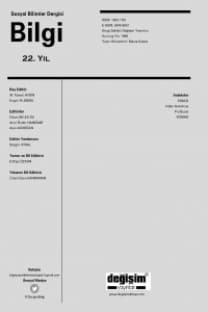New Perspectives in Security Studies
Güvenlik çalışmaları Uluslararası İlişkiler disiplini içinde uzun süredir ayrıcalıklı bir statüye sahip olmuş ve en verimli alt-disiplin olarak gösterilmiştir. Güvenliğin realist-geleneksel değerlendirmeleri bu alt-disiplinde hep ön plana çıkmıştır. Fakat 1990’larla birlikte geleneksel değerlendirmelerin sunduğu kuramsal ve kavramsal araçlar ciddi eleştirilerle karşılaşmıştır. Özellikle 1980’lerin sonundan itibaren, geleneksel değerlendirmelere karşı yöneltilen ve feminizmden konstrüktivizme kadar bir dizi alternatif bakış ortaya çıkmıştır. Bu eleştiriler rasyonalist, materyal ve bilimsel nitelikli geleneksel güvenlik çalışmalarına karşı yöneltilmiş ve realizmin çeşitli varsayımlarına meydan okumuştur. Söz konusu eleştiriler temelde güvenlikle ilgili maddi verilerin aksine fikirlerin, kültürlerin ve tarihsel süreçlerin önemini vurgulayan alternatif analizler sunmuşlardır. Bu makale işte bu alternatiflerden ikisini yani çoğunlukla Ayoob’un tartışmalarıyla şekillenen Üçüncü Dünya güvenlik çalışmalarını ve yine çoğunlukla Wendt’in tartışmalarıyla şekillenen konstrüktivist güvenlik çalışmalarını mercek altına alacaktır. Geleneksel realist kuramın kısa bir değerlendirmesinden sonra, makale bu iki bakışın ana parametrelerini, varsayımlarını ve meydan okumalarını sunacak, son olarak bunların da bir eleştirisini sunacaktır.
Anahtar Kelimeler:
Güvenlik, Realist Güvenlik, Konstrüktüvist Güvenlik, Üçüncü Dünya Güvenliği
Security studies have long enjoyed a privileged academic status within the International Relations discipline (IR), projected as the most promising subfield of IR. In this subfield, traditional accounts of security long dominated the field. However, since the 1990s the theoretical and conceptual tools of the traditional accounts have faced serious criticisms. Particularly since the late 1980s, there emerged a plethora of challenges to the traditional accounts of security ranging from the feminists to the constructivist perspectives. These criticisms take on the rationalist, material and scientific security studies and challenge their various understandings. They also offer alternative analyses of security that signify the importance of ideas, culture and history along with material accounts. This paper will engage with two such alternative visions of security, namely the Third World security and constructivist security studies by largely focusing on the representative works of Ayoob and Wendt, respectively. After briefly describing the traditional realist formulation, the paper will assess the basic parameters, premises and challenges of these two alternatives and then provide some criticisms of these alternatives.
Keywords:
Security, Realist Security, Third World Security, Constructivist Security,
- ISSN: 1302-1761
- Yayın Aralığı: Yılda 2 Sayı
- Başlangıç: 1999
- Yayıncı: Değişim Yayınları
Sayıdaki Diğer Makaleler
Sanat Sosyolojisinin İmkânına ve İnşasına Dair
New Perspectives in Security Studies
Düşüncenin Tarihselliği ve Emperyalizm Üzerine
İnsan Kaynakları Bilgi Sistemlerinin İki Yüzü: Bilgi Paylaşımı mı Yönetim Kontrolü mü?
Serkan BAYRAKTAROĞLU, Yasemin ÖZDEMİR
